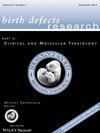Christy M. McKinney, Araya Pisek, Bowornsilp Chowchuen, Timothy DeRouen, Benja Muktabhant, Suteera Pradubwong, Cathy Yeung, Waranuch Pitiphat
下载PDF
{"title":"泰国营养与环境因素与唇腭裂风险的病例对照研究","authors":"Christy M. McKinney, Araya Pisek, Bowornsilp Chowchuen, Timothy DeRouen, Benja Muktabhant, Suteera Pradubwong, Cathy Yeung, Waranuch Pitiphat","doi":"10.1002/bdra.23505","DOIUrl":null,"url":null,"abstract":"<div>\n \n <section>\n \n <h3> Background</h3>\n \n <p>One infant in 700 is born with an oral cleft. Prior studies suggest low micronutrient status is associated with an increased risk of oral clefts. Environmental factors such as passive smoke exposure or supplement use may also affect oral cleft risk. We examined nutrition and environmental related risk factors for oral clefts.</p>\n </section>\n \n <section>\n \n <h3> Methods</h3>\n \n <p>We conducted a case–control study in Northeast Thailand in 2012 to 2013. We enrolled 95 cases and 95 controls. We recruited cases with a nonsyndromic cleft lip with or without a cleft palate (CL±P) less than 24 months old. Cases were matched to controls on age and place of conception. We collected survey data, a food frequency questionnaire, and measured zinc concentrations in toenail trimmings. We calculated descriptive statistics by case and control status. We used conditional logistic regression to estimate unadjusted and adjusted associations, 95% confidence intervals (CIs), and <i>p</i>-values.</p>\n </section>\n \n <section>\n \n <h3> Results</h3>\n \n <p>Any liver intake (adjusted OR [aOR] for ≥1/week versus none), 10.58; 95%CI, 1.74–64.37, overall <i>p</i> = 0.02) and the presence of food insecurity (aOR, 9.62; 95% CI, 1.52–61.05; <i>p</i> = 0.02) in the periconceptional period increased CL±P risk. Passive smoke exposure increased the risk of CL±P (aOR, 6.52; 95% CI, 1.98–21.44; <i>p</i> < 0.01). Toenail zinc concentrations were not associated with CL±P risk.</p>\n </section>\n \n <section>\n \n <h3> Conclusion</h3>\n \n <p>Our findings add to a growing body of knowledge of environmental risk factors for oral clefts from low- and middle-income countries. Our findings on liver are contradictory to prior results. Large multisite studies are needed to identify environmental and genetic risk factors for oral clefts. Birth Defects Research (Part A) 106:624–632, 2016. © 2016 Wiley Periodicals, Inc.</p>\n </section>\n </div>","PeriodicalId":8983,"journal":{"name":"Birth defects research. Part A, Clinical and molecular teratology","volume":"106 7","pages":"624-632"},"PeriodicalIF":0.0000,"publicationDate":"2016-04-21","publicationTypes":"Journal Article","fieldsOfStudy":null,"isOpenAccess":false,"openAccessPdf":"https://sci-hub-pdf.com/10.1002/bdra.23505","citationCount":"18","resultStr":"{\"title\":\"Case–control study of nutritional and environmental factors and the risk of oral clefts in Thailand\",\"authors\":\"Christy M. McKinney, Araya Pisek, Bowornsilp Chowchuen, Timothy DeRouen, Benja Muktabhant, Suteera Pradubwong, Cathy Yeung, Waranuch Pitiphat\",\"doi\":\"10.1002/bdra.23505\",\"DOIUrl\":null,\"url\":null,\"abstract\":\"<div>\\n \\n <section>\\n \\n <h3> Background</h3>\\n \\n <p>One infant in 700 is born with an oral cleft. Prior studies suggest low micronutrient status is associated with an increased risk of oral clefts. Environmental factors such as passive smoke exposure or supplement use may also affect oral cleft risk. We examined nutrition and environmental related risk factors for oral clefts.</p>\\n </section>\\n \\n <section>\\n \\n <h3> Methods</h3>\\n \\n <p>We conducted a case–control study in Northeast Thailand in 2012 to 2013. We enrolled 95 cases and 95 controls. We recruited cases with a nonsyndromic cleft lip with or without a cleft palate (CL±P) less than 24 months old. Cases were matched to controls on age and place of conception. We collected survey data, a food frequency questionnaire, and measured zinc concentrations in toenail trimmings. We calculated descriptive statistics by case and control status. We used conditional logistic regression to estimate unadjusted and adjusted associations, 95% confidence intervals (CIs), and <i>p</i>-values.</p>\\n </section>\\n \\n <section>\\n \\n <h3> Results</h3>\\n \\n <p>Any liver intake (adjusted OR [aOR] for ≥1/week versus none), 10.58; 95%CI, 1.74–64.37, overall <i>p</i> = 0.02) and the presence of food insecurity (aOR, 9.62; 95% CI, 1.52–61.05; <i>p</i> = 0.02) in the periconceptional period increased CL±P risk. Passive smoke exposure increased the risk of CL±P (aOR, 6.52; 95% CI, 1.98–21.44; <i>p</i> < 0.01). Toenail zinc concentrations were not associated with CL±P risk.</p>\\n </section>\\n \\n <section>\\n \\n <h3> Conclusion</h3>\\n \\n <p>Our findings add to a growing body of knowledge of environmental risk factors for oral clefts from low- and middle-income countries. Our findings on liver are contradictory to prior results. Large multisite studies are needed to identify environmental and genetic risk factors for oral clefts. Birth Defects Research (Part A) 106:624–632, 2016. © 2016 Wiley Periodicals, Inc.</p>\\n </section>\\n </div>\",\"PeriodicalId\":8983,\"journal\":{\"name\":\"Birth defects research. Part A, Clinical and molecular teratology\",\"volume\":\"106 7\",\"pages\":\"624-632\"},\"PeriodicalIF\":0.0000,\"publicationDate\":\"2016-04-21\",\"publicationTypes\":\"Journal Article\",\"fieldsOfStudy\":null,\"isOpenAccess\":false,\"openAccessPdf\":\"https://sci-hub-pdf.com/10.1002/bdra.23505\",\"citationCount\":\"18\",\"resultStr\":null,\"platform\":\"Semanticscholar\",\"paperid\":null,\"PeriodicalName\":\"Birth defects research. Part A, Clinical and molecular teratology\",\"FirstCategoryId\":\"1085\",\"ListUrlMain\":\"https://onlinelibrary.wiley.com/doi/10.1002/bdra.23505\",\"RegionNum\":0,\"RegionCategory\":null,\"ArticlePicture\":[],\"TitleCN\":null,\"AbstractTextCN\":null,\"PMCID\":null,\"EPubDate\":\"\",\"PubModel\":\"\",\"JCR\":\"Q\",\"JCRName\":\"Medicine\",\"Score\":null,\"Total\":0}","platform":"Semanticscholar","paperid":null,"PeriodicalName":"Birth defects research. Part A, Clinical and molecular teratology","FirstCategoryId":"1085","ListUrlMain":"https://onlinelibrary.wiley.com/doi/10.1002/bdra.23505","RegionNum":0,"RegionCategory":null,"ArticlePicture":[],"TitleCN":null,"AbstractTextCN":null,"PMCID":null,"EPubDate":"","PubModel":"","JCR":"Q","JCRName":"Medicine","Score":null,"Total":0}
引用次数: 18
引用
批量引用

 求助内容:
求助内容: 应助结果提醒方式:
应助结果提醒方式:


